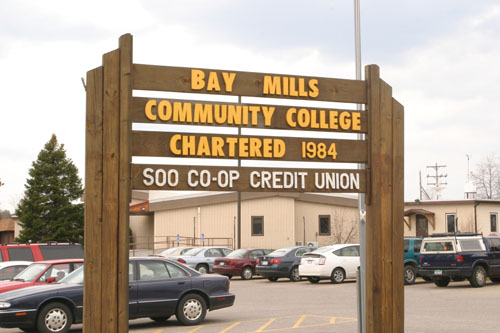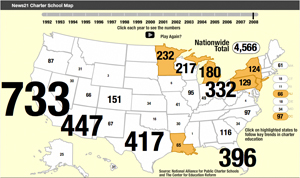The Next Casinos for Michigan’s Tribal Communities?
Annie Hauser | Jul 28, 2009 | Comments 4

By Annie Hauser and Jamie Oppenheim
For at least one Michigan tribal college, charter schools could become an unlikely money-making industry.
In Michigan, each charter school has to have an educational agency like a college or school district to grant its charter and authority as a public school. These authorizers are then responsible for some oversight duties.
One such authorizer, Bay Mills Tribal Community College in Brimley, grossed $3.2 million in administrative and assessment fees last year from the 41 charter schools it has authorized. It’s not a huge cash windfall by most measures. But since the school is the only authorizer with no restriction on how many charters it can launch, or where they can be located, the potential for more revenue is unlimited.
Michigan law permits charter authorizers to collect 3 percent from each school’s annual revenue. Twenty-six other groups have authorized 150 charters in Michigan, the state limit that was reached in 1998. Only Bay Mills Tribal Community College has continued to authorize charters since then, above and beyond the cap.
That’s because Bay Mills found a loop hole in the state law. Other community colleges, school districts and educational agencies are restricted to chartering a finite number of Michigan charters within their own geographic vicinity. Only state colleges can authorize charters statewide. Currently, Central Michigan University is the state’s largest authorizer with 57 schools.
But since Bay Mills operates with money from the Bureau for Indian Affairs and follows federal tribal laws, the community college argued that the restrictions do not apply. The 3 percent fee from each school covers operation expenses and the cost of evaluating each school. According to Pat Shannon, director of charter schools for Bay Mills Community College, the fee comes to $219 per student.
So far, out of Bay Mills’ 41 charters, only one of the schools, the Ojibwe Charter School, is in the Upper Peninsula where Bay Mills is located. The Ojibwe Charter School serves 88 local children at the end of a small dirt road a few hundred feet from the college. The rest of Bay Mills’ schools are scattered across the state in towns such as Flint, Kalamazoo, Dearborn Heights and Pontiac — all far from rural Brimley.
Because of this, Bay Mills contracts out to a third-party oversight company based in Saginaw called Quality Performance Resource Group. The company is staffed by former educators who conduct six site visits annually to all of Bay Mills’ schools. At the end of the year, Q.P.R. Group provides a charter compliance report to the board of each school. Mary Lee Cornford, senior field consultant at the Q.P.R. Group, says she believes Bay Mills schools are kept more accountable because it is the only authorizer to use an outside group to check up on schools.
Despite this, the college’s chartering power has not gone unchallenged.
In 2005, the Michigan Education Association, Michigan’s teachers union, filed a lawsuit against the state department of education and other public officials for financing schools chartered by Bay Mills Community College.
Michigan’s teachers union charged that the community college, which authorizes more than 30 schools run by outside management companies, had illegally delegated its oversight responsibility. The group also alleged that Bay Mills cannot be a public charter school authorizer and that its schools aren’t public because the college’s board is not publicly elected. The courts ruled in favor of Bay Mills, holding that its charter authorization authority does not damage the interests of the MEA.
“There is a presumption that because we’re a minority college and from the U.P. we’re not up to the task,” Shannon said. “We’ve proven that we provide more oversight for our schools just because of who we are.”
Bay Mills plans to open two new schools this fall in Curtis and Lansing. Since charter contracts only last for eight years, some of its oldest schools are up for reauthorization. Overall, Shannon said the tribal college has had some successes and some shortcomings, estimating that eight schools are in critical condition, and another 20 percent need to be monitored.
Under Shannon’s recommendation, Bay Mills has self-imposed a limit on the numbers of charters it will authorize, limiting its profit potential to focus on existing schools.
“One of the criticisms early on is that we would be a charter mill. We have not done that, we’ve been very cautious,” he said. “But the board said if there are good ideas out there we should look at them, but we’re going to be cautious as we move forward. Never say no.”
Filed Under: Michigan • Unchartered Territory
About the Author:














I like your site.I’ll come back later.great site and your writing style is amazing,just
You should really take a look at the $50 free chip being offered at our new Bet Phoenix Casino. Limited time offer at: Bet Phoenix. Good luck!
hi, I apologize with regard to the bad english. Relating to your own write-up, you should examine my site for manuals and ideas.
The March 21 bout was recently described as “abandoned” by FiveOuncesOfPain.com, and MMAjunkie.com (www.mmajunkie.com) has since confirmed that Sherk was removed from the potential matchup due to an undisclosed injury.